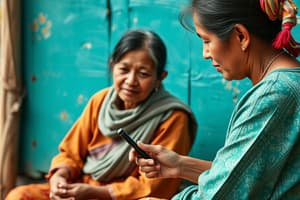Podcast
Questions and Answers
What is the primary focus of ethnomethodology?
What is the primary focus of ethnomethodology?
- Understanding the measurable effects of social interactions
- Examining invisible rules that guide everyday behavior (correct)
- Analyzing the statistical patterns of social behavior
- Studying how individuals create their own perceptions of reality
What does the concept of 'definition of the situation' emphasize in symbolic interactionism?
What does the concept of 'definition of the situation' emphasize in symbolic interactionism?
- The influence of cultural norms on behavior
- The biological factors affecting behavior
- The subjective understanding of individuals in a situation (correct)
- The objective circumstances of a situation
Which step is NOT part of the deductive reasoning process?
Which step is NOT part of the deductive reasoning process?
- Performing analysis to test hypotheses
- Collecting data based on hypotheses
- Putting forth a theory
- Developing a hypothesis from gathered data (correct)
What characterizes emergent design in qualitative research?
What characterizes emergent design in qualitative research?
What is the primary concern of impression management as proposed by Erving Goffman?
What is the primary concern of impression management as proposed by Erving Goffman?
What is a distinguishing feature of mixed-methods research?
What is a distinguishing feature of mixed-methods research?
What is NOT a component of indigenous methodologies?
What is NOT a component of indigenous methodologies?
What concept refers to the way individuals perceive themselves based on how they believe others see them?
What concept refers to the way individuals perceive themselves based on how they believe others see them?
What does operationalize refer to in research?
What does operationalize refer to in research?
What is the main focus of symbolic interactionism?
What is the main focus of symbolic interactionism?
Which of the following best describes the concept of theoretical saturation?
Which of the following best describes the concept of theoretical saturation?
What does the term moral entrepreneurs refer to?
What does the term moral entrepreneurs refer to?
What is the key idea behind the realist perspective in research?
What is the key idea behind the realist perspective in research?
What does two-eyed seeing refer to in research methodologies?
What does two-eyed seeing refer to in research methodologies?
Participatory action research (PAR) primarily aims to:
Participatory action research (PAR) primarily aims to:
What does the hierarchy of credibility imply in social research?
What does the hierarchy of credibility imply in social research?
Flashcards are hidden until you start studying
Study Notes
Breaching Experiment
- Utilizes an ethnomethodological approach to examine unspoken social norms by deliberately violating them.
Casual Knowledge
- Assumes reality consists of observable, measurable causes and effects independent of an individual’s perception.
Deductive Reasoning
- Involves formulating a theory, developing hypotheses, collecting data, and analyzing results to test these hypotheses.
Definition of the Situation
- Central to symbolic interactionism, suggesting that individual behavior is shaped more by their perception of a situation than by the situation's objective characteristics.
Emergent Design
- A feature of qualitative research where strategies evolve during the study as the researcher gains insight into the social context.
Ethnomethodology
- Investigates the implicit rules guiding daily interactions and behaviors among individuals.
Generic Social Processes
- Describes interaction patterns that occur across different situations, such as identity formation and emotional experiences.
Impression Management
- Concept introduced by Erving Goffman, focusing on how individuals manage the perceptions others have of them through their behavior and presentation.
Indigenous Methodologies
- Research approaches that respect Indigenous knowledge systems and foster meaningful relationships with community participants.
Indigenous Resurgence
- Emphasizes the connection of Indigenous peoples to their land and the transformation through understanding the consequences of colonization.
Looking-Glass Self
- The notion that self-perception is shaped by how one believes others perceive them.
Mixed-Methods Research
- Integrates qualitative and quantitative approaches to provide a more comprehensive understanding than either method could achieve alone.
Moral Entrepreneurs
- Groups or individuals advocating for the classification of certain behaviors as deviant or normal within society.
Operationalize
- Process of translating a theoretical concept into a structured hypothesis for practical research use.
Positivism
- The doctrine suggesting that scientific methods can reveal the 'laws' governing human behavior, enabling predictions and control.
Realist Perspective
- Assumes a discoverable reality exists independently of social constructs.
Research Participants
- Individuals who consent to participate in research, providing insights through interviews or by allowing observation.
Symbolic Interactionism
- A view that emphasizes understanding the meanings created and shared through social interactions in everyday life.
Theoretical Saturation
- Occurs when additional data collection yields no new insights, prompting the researcher to halt the research process.
Two-Eyed Seeing
- A research paradigm that values both Indigenous and Western knowledge systems collaboratively.
Verstehen
- Max Weber's concept implying that researchers should strive for a deep understanding of participants' perspectives.
Community-Based Research
- A collaborative research framework that actively involves community members in various study stages, sharing control between researchers and participants.
Hierarchy of Credibility
- Refers to societal biases where those in higher status or expertise positions are perceived as more credible than marginalized individuals.
Indicators
- Specific, measurable signs developed to investigate broader abstract concepts in research.
Participatory Action Research (PAR)
- A research approach focusing on community involvement, aiming to identify needs and influence social policy to enhance group wellbeing.
Prescriptive
- Refers to approaches that enforce judgments of right and wrong behavior, contrasting with the analytical nature of qualitative research.
Studying That Suits You
Use AI to generate personalized quizzes and flashcards to suit your learning preferences.




